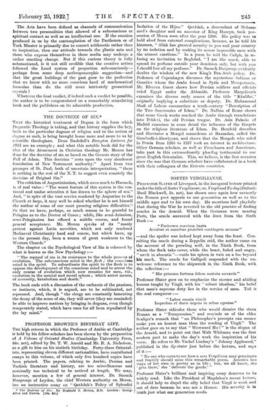THE DOCTRINE OF SIN.* THAT the historical treatment of Dogma
is the form which Dogmatic Theology is taking, and that history supplies the key, both to the particular dogmas of religion and to the notion of dogma as such, is being brought home more and more to us by scientific theologians. Dean Rashdall's Bampton Lectures for 1915 are an example ; and what this notable book did for the idea of the Atonement in Christian theology Mr. Moron has (lane for the doctrine of sin as based on the Genesis story of the Fall of Adam. This doctrine "rests upon the very slenderest foundation of New Testament authority." Apart from two passages of St. Paul, both of uncertain interpretation, "there is nothing in the rest of the N. T. to suggest even remotely the doctrine of Original Sin."
The criticism of Augustinianism, which owes much to Harnack, is of real value : "The worst feature of this system is the con- tinual and undue attention it has drawn to the sphere of sex." And, "in spite of the vast service rendered by Augustine to the Church at large, it may well be asked whether he is not himself the author of some of our most pressing religious difficulties:*
So that we have, perhaps, as much reason to be grateful to Pelagius as to the Doctor of Grace ; while, like semi-Arianism, semi-Pelagianism has offered a middle course, and found general acceptance. Mr. Moron speaks of its "manly protest against Latin novelties, which not only rendered Mediaeval Christianity hard and coarse, but which have, up to the present day, been a source of great weakness to the
Western Church."
The chapter ca the Psychological View of Sin is coloured by what is known as the New Psychology :—
" The reproof of sin is its resistance to the whole process of evolution. The subconscious mind is the flesh ; the conscious mind is the spirit. To subordinate the spirit to the flesh is to oppose the development of the conscious mind and to arrest the only course of evolution which now remains for men, viz., evolution in the mental and moral sphere which arrest means, of necessity, katabolism and death."
The book ends with a discussion of the catharsis of the passions, or instincts, which, it is argued, are to be sublimated, not repressed. And, though "the clergy are constantly lamenting the decay of the sense of sin, they will never (they are reminded) be able to improve matters by bringing in dogmas, even though temperately stated, which have once for all been repudiated by the lay mind."


































 Previous page
Previous page